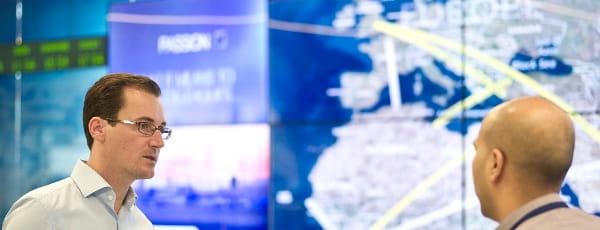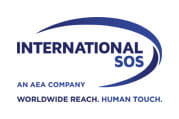Behind the Scenes at Major sporting events
Published: 17 August 2015
The 2016 Olympic Games, to be held in Rio de Janeiro, are fast approaching. The world will be watching the triumphs and tribulations of each unfolding performance. Meanwhile, behind the scenes, an army of people will make it all happen.

At International SOS preparations ahead of this next major event are already underway. Our role is to prepare organisations and their international travellers for this memorable experience.
We have an extensive record in providing medical care and assistance seamlessly integrated with our security services at major sporting events. This is giving our members the ability to have a safe and healthy experience, whatever their involvement in the event.
International SOS has been closely involved in many past Olympic Games including Sydney 2000, Athens 2004, Beijing 2008 and London 2012. We were equally involved in the football Confederations Cup 2013 and the World Cup 2014. These were both held in Brazil, further adding to our local knowledge.
ANYTHING CAN HAPPEN
Mike Reedy is Regional Security Manager, Americas, International SOS and Control Risks. He is already helping those clients attending the games develop risk mitigation strategies with the aim of ensuring the safety of all employees and guests.
Now is the intelligence gathering stage. Protests in Brazil are common yet many are wondering if these are likely in 2016. During the Confederations Cup, there was unrest as the protesters wanted to attract attention. In contrast, during the World Cup the protesters remained calm. They wanted to watch their national heroes and had no desire to disrupt the event. Some would say Brazilians may not be so keen on the Olympics and that could initiate a different scenario. We are keeping a close watch on social media, especially Twitter. The protesters, anti-government activists and the Government itself are all being carefully monitored.
Furthermore, Brazil is facing its worst drought in 80 years. If water is short, the protesters will be physically unable to protest. This is all taken into account to help clients identify various risks and scenarios.
Keeping clients updated will be another priority. During both football tournaments we reported on events quickly and tied advice to it to keep travellers and their organisations informed. We had people on the ground constantly monitoring the situation including social media. If unrest or any other significant incident occurred we quickly reported it. We advised what precautions to take and which streets to avoid.
As Mike Reedy concludes, “Companies often presume that they will have easy access to assistance, should they need it. But that isn’t always the case. They may only find basic information online, which isn’t helpful in an emergency. Whereas we truly can help in a matter of minutes - thanks to our excellent teams in both Philadelphia and Rio."
MATCH PROGRAMME? CHECK
REPLICA SHIRT? CHECK
SUNSCREEN? CHECK
GETTING TO THE BEST HOSPITAL IN TOWN? CHECK
Major events bring their share of illness, accidents and injury. There is also the increased risk of diseases spreading in crowded places. This can easily overburden the local healthcare system. Just getting an ambulance through large crowds and heavy traffic can be a problem. Language and cultural barriers often add to the stress in such situations.
During the World Cup we dealt with 26,000 calls over 57 days. Of these 8,826 were medical cases, of which 251 were medical evacuations. The vast majority of incidents occurred on match days. We are using all that experience to prepare for 2016.
On the ground assistance is key. We will be providing private on-site facilities, in the most popular hotels. Other hotels will have First Aid stations staffed by nurses, backed up by our clinics. Dr Ivan Drummond, CEO, International Health Care (IHC), explains that our clients are closely involved in these plans. They too are suggesting changes based on past experience: “Some of our clients are now interested in combining resources. Instead of having a clinic or ground ambulances dedicated solely to them they want to share. This makes fiscal sense and we are working on it.”
We are also looking at again placing Liaison Officers in the key hospitals. For the World Cup we had 48 Liaison Officers in 14 credentialed hospitals across the different locations. They provided 24/7 support (language and otherwise) for any of our members sent to the hospital. Liaison Officers wear badges and special shirts so they stand out. Each must be able to speak Portuguese and English; many speak other languages too. They act as ambassadors, help translate, explain what is happening and bridge any cultural gaps.
DEFINING THE NEXT GENERATION OF ASSISTANCE
IHC already provides TeleHealth services to many offshore rigs. It is part of our global project to build a digital TeleHealth platform. This will enable members to access assistance via phone, video and messaging. As Dr Drummond explains: “We want to provide a global medical solution. For example, we could use it to link up a Japanese patient in Rio with a Japanese doctor (in our Tokyo Assistance Centre). Being able to access foreign doctors in real time is something our clients are very interested in. Doing this via mobile phone is another advantage.”
The Digital Platform is in the planning stages at the moment. The aim is to have it up and running ready for 2016. Dr Robert Quigley, Regional Medical Director and Senior Vice President, Medical Assistance, Americas, sums up: “We are building on past experience and exploring some excellent new approaches. This includes the latest in tele-assistance, looking at the potential for client collaboration, and supplying even stronger on-the-ground support. The close alignment between our IHC and Philadelphia teams is paying off. Our extensive preparations for 2016 are well underway.”



